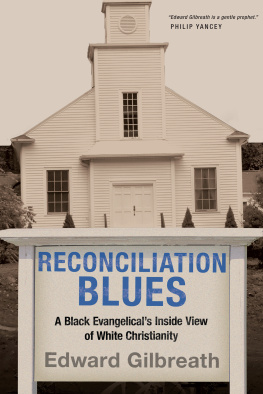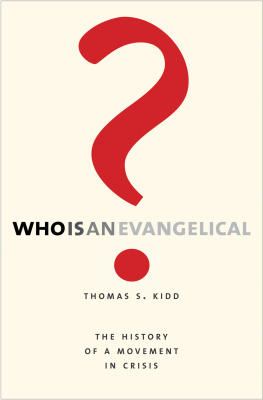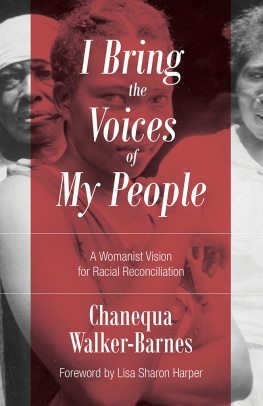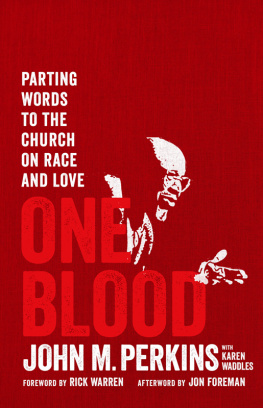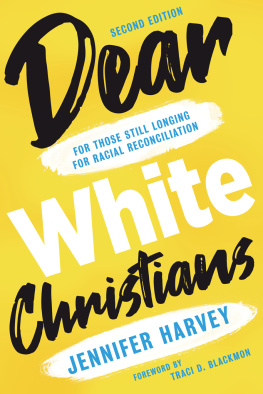Sommaire
Pagination de ldition papier
Guide
RECONCILIATION
BLUES
A Black Evangelicals Inside View
of White Christianity
Edward Gilbreath
InterVarsity Press
P.O. Box 1400, Downers Grove, IL 60515-1426
ivpress.com
2006 by Edward Gilbreath
All rights reserved. No part of this book may be reproduced in any form without written permission from InterVarsity Press.
InterVarsity Press is the book-publishing division of InterVarsity Christian Fellowship/USA, a movement of students and faculty active on campus at hundreds of universities, colleges and schools of nursing in the United States of America, and a member movement of the International Fellowship of Evangelical Students. For information about local and regional activities, visit intervarsity.org.
All Scripture quotations, unless otherwise indicated, are taken from the Holy Bible, New International Version. NIV. Copyright 1973, 1978, 1984 by International Bible Society. Used by permission of Zondervan Publishing House. All rights reserved.
Published in association with the Books & Such Literary Agence, Janet Kobobel Grant, 52 Mission Circle, Suite 122, PMB 170, Santa Rosa, CA 95409-5370, www.booksandsuch.biz.
The publisher can't verify the accuracy of website hyperlinks beyond the date of print publication.
Design: Cindy Kiple
Images: country church: Bonita Cheshier/Dreamstime.com sign: Loic Bernard/istockphoto.com
ISBN 978-0-8308-7666-2 (digital)
ISBN 978-0-8308-3362-7 (print)
This digital document has been produced by Nord Compo.
There is no truth towards Jesus
without truth towards man.
Untruthfulness destroys fellowship,
but truth cuts false fellowship to pieces
and establishes genuine brotherhood.
DIETRICH BONHOEFFER,
THE COST OF DISCIPLESHIP
First go and be reconciled to your brother;
then come and offer your gift.
MATTHEW 5:24
Prologue
SINGING THE RECONCILIATION BLUES
The blues are like spirituals, almost sacred. When we sing blues, were singing out our hearts, were singing out our feelings. Maybe were hurt and just cant answer back, then we sing or maybe even hum the blues.
When I sing... what Im doing is letting my soul out.
Alberta Hunter
I am sick and tired of racial reconciliation.
Thats what a friend of mine e-mailed me recently. We had been talking about Christians and race again, and she was letting off some steam. Shes actually a gentle, peace-loving black person, who laughs at cheesy jokes and spends Saturday mornings hunting for Precious Moments figurines at thrift shops. She works at an evangelical Christian company, and white people are generally not afraid of her.
By saying she was sick and tired of racial reconciliation, my friend didnt mean that she was against people of different races coming together in the church. She was simply expressing her fatigue over the running-in-place stagnancy she believed was passing for racial unity among evangelicals.
Im roundly discouraged about the possibility of true racial reconciliation in the church, she said. I honestly dont believe it will ever happen on a large scaleat least not in my lifetime.
At the time of our correspondence, my friend was twenty-six.
Why did she feel this way? Why would any middle-class black American under forty even need to think about race? After all, Jim Crow flew the coop decades ago. And, save for the occasional overzealous cop or overworked server at Dennys, theres very little daily evidence of racially motivated discrimination in America today. Right?
As some of you grumble under your breath at me, allow me to admit that Im stretching the point a little. Things are by no means all sweet and rosy on the race-relations front. Our nation continues to stumble. But, overall, most people would concede that theres been significant progress. Its almost impossible for people from my thirtysomething generation and below to grasp what racism used to look like. My parents, who adopted me in the early 1970s when they were both well into their fifties, were children of the segregated Southmy dad was from Alabama, my mom from Louisiana. For them, Whites Only signs were as normal as No Smoking signs are for us today. Mom and Dad used to tell me stories about the separate water fountains and the special seating at the back of buses. Yet, like an anthropologist studying a prehistoric civilization, I strained to imagine how it must have felt.
I worked with the evangelist Howard O. Jones on his autobiography a few years ago, and he told me about the backlash he faced when he agreed to become Billy Grahams first African American associate in the late 1950s. Fellow evangelical clergymen shot him dirty looks. A London hotel refused to give him a room. Several of Grahams donors withdrew their support and sent Graham letters with ominous warnings like, Dont do it, Reverend Graham and Youre going to ruin your ministry by putting a Negro on your team.
When Howard told me these things, I imagined an uptight white preacher sitting in his church office, turning beet red as he dashed off his angry missive. He probably wrote it right before preparing his Sunday homily on Gods unconditional love. And he likely felt he was doing Gods will.
Generally speaking, Christians dont do that stuff anymore. Were more enlightened these days. Weve read To Kill a Mockingbird and analyzed the movie Crash over coffee with our friends. Weve heard John Perkins speak at our churches and had our feet stepped on by Tony Campolo at our college chapels. Weve lit candles at Promise Keepers and volunteered at inner-city churches. Weve prayed, apologized and wept. Weve broken down walls, stood in the gap and sung Russ Taffs We Will Stand a zillion times at our annual combined services. We know theres a racial divide in the church, and weve been throwing our best stuff at it for the last forty years.
In America, and in the church, things have improvedat least on the surface. While few would say racism is completely dead, most suspect its at least on life support.
Yet my friends e-mail sticks in my head. Despite all the visible advances in race relations, something is still broken. And racism seems like too convenient of a term to slap on it. No, its now a more subtle and elusive thing. To paraphrase Supreme Court Justice Potter Stewarts famous quote about pornography: I cant define it, but I know it when I see it.
For many people, institutional racism is now the term invoked to describe the unnamable brand of discrimination we experience today. The phrase was first coined by controversial black activist Stokely Carmichael and his coauthor, Charles Hamilton, in their 1967 book Black Power: The Politics of Liberation. But sociologist James Jones provided the most concise definition in his book Prejudice and Racism when he described it as those established laws, customs, and practices which systematically reflect and produce racial inequities in American society.
Todays most prevalent examples of institutional racism include the failures of public education in urban communities (why are inner-city schools devoid of proper resources?), imbalances in our nations criminal justice system (whats with the inordinate number of black males in prison?), and the inability of African Americans and other minorities to keep pace with their white counterparts economically (why do some banks charge higher rates on loans to African Americans and Latinos?).

